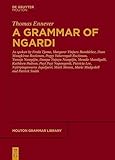A Grammar of Ngardi : As spoken by F. Tjama, M. Yinjuru Bumblebee, D. Mungkirna Rockman, P. Yalurrngali Rockman, Y. Nampijin, D. Yujuyu Nampijin, M. Mandigalli, K. Padoon, P. P. Napangardi, P. Lee, N. Japaljarri, M. Moora, M. Mudgedell and P. Smith / Thomas Ennever.
Material type: TextSeries: Mouton Grammar Library [MGL] ; 92Publisher: Berlin ; Boston : De Gruyter Mouton, [2021]Copyright date: ©2021Description: 1 online resource (XXII, 773 p.)Content type:
TextSeries: Mouton Grammar Library [MGL] ; 92Publisher: Berlin ; Boston : De Gruyter Mouton, [2021]Copyright date: ©2021Description: 1 online resource (XXII, 773 p.)Content type: - 9783110752328
- 9783110752526
- 9783110752434
- 410
- online - DeGruyter
- Issued also in print.
| Item type | Current library | Call number | URL | Status | Notes | Barcode | |
|---|---|---|---|---|---|---|---|
 eBook
eBook
|
Biblioteca "Angelicum" Pont. Univ. S.Tommaso d'Aquino Nuvola online | online - DeGruyter (Browse shelf(Opens below)) | Online access | Not for loan (Accesso limitato) | Accesso per gli utenti autorizzati / Access for authorized users | (dgr)9783110752434 |
Frontmatter -- Acknowledgements -- Contents -- Abbreviations, symbols and conventions -- 1. Introduction -- 2. Phonology -- 3. Word classes -- 4. Nominals I: Case and nominal morphology -- 5. Nominals II: Nominal subclasses -- 6. Bound pronouns -- 7. Verbal morphology -- 8. Complex predication -- 9. Grammatical relations and argument structure -- 10. Auxiliaries, particles and modal constructions -- 11. Complex syntax -- Appendix: Narrative texts -- References -- Index
restricted access online access with authorization star
http://purl.org/coar/access_right/c_16ec
Ngardi is a highly endangered language with fewer than 10 remaining speakers and is no longer being acquired by children. Despite the limited circulation of a draft dictionary (Cataldi, 2011), there has been no published reference grammar of this language. Upon publication, this work will constitute the most comprehensive grammar of any Ngumpin-Yapa language. The Ngardi language exhibits many of the same typologically interesting features first identified in the related language Warlpiri—namely phenomena of non-configurational syntax and null anaphora. This grammar also brings to light a number of unique properties which will be of interest to linguistic typologists and formal theorists. The registration of arguments both through case marking on free NPs as well as in pronominal enclitics is similar to Warlpiri but differs in its detail—particularly in the ability to register various non-core cases (e.g. locative and allative) as ‘arguments’ in the pronominal complex. Within the verbal system, Ngardi is notably for a large number of verbal inflections (~20) which mark various distinctions in tense, aspect and mood, as well as associated motion and speaker-centric directionality. Ngardi exhibits a highly articulated system of complex predication, covering both complex verb and serial verb constructions. Other typologically interesting aspects of the language include the presence of dedicated apprehensional constructions and interesting interactions between negation and clausal modality. The descriptive value of this grammar is enhanced by its sustained regional comparison of the linguistic features of Ngardi with those of neighbouring Ngumpin-Yapa and Western Desert languages. This grammar (and a forthcoming dictionary) of Ngardi will be of great significance to both those few remaining Ngardi speakers as well as the next generation of Ngardi people for whom accessible published materials will be an invaluable resource.
Issued also in print.
Mode of access: Internet via World Wide Web.
In English.
Description based on online resource; title from PDF title page (publisher's Web site, viewed 25. Jun 2024)


